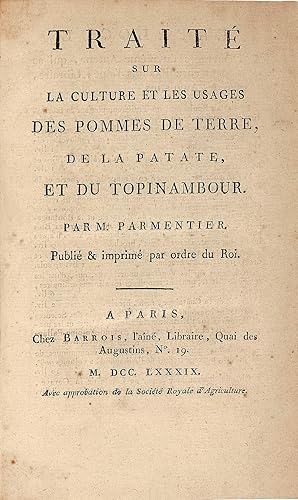Beschreibung
Paris, Barrois l'ainé, 1789.Avec approbation de la Société Royale d'Agriculture.In-8 de viii ff. prél., 389 pp., (2) ff. pour l'extrait des registres et l'errata insérés entre les pp. 386 et 388. Extrait du Journal de Paris du 7 janvier 1789 relatifs à Parmentier inséré entre les pp. 204 et 205, pte. déchirure sans atteinte au texte p. 273. Demi-veau brun, ornementation rocaille dorée sur le dos lisse, tranches jaspées vertes. Reliure vers 1830.195 x 125 mm. --- Édition originale recherchée du célèbre ouvrage de Parmentier consacré à la culture et à la consommation de la pomme de terre, jusque là abandonnée aux animaux.Vicaire, Bibliographie gastronomique, 657 ; Manquait à Oberlé, Les Fastes de Bacchus et Comus. Élevé pauvrement ainsi que ses deux frères par une mère veuve de bonne heure, Parmentier dut interrompre ses études à dix-huit ans pour entrer en apprentissage chez un apothicaire de Mont Didier puis en 1756 chez un apothicaire de Paris.Il obtint à 20 ans une place d'aide-pharmacien à l'armée de Hanovre en opération dans la guerre de Sept Ans. Fait prisonnier par les troupes de Frédéric ii, c'est en captivité qu'il mangea pour la première fois des pommes de terre, nourriture de base des Prussiens, comme d'ailleurs de la moitié des peuples de l'Europe.Par expérience personnelle donc, il s'assura que cet aliment était bon et sain, qu'il n'était ni fade ni insipide, qu'il ne donnait ni la lèpre ni les fièvres, préjugés que partageait la majorité des Français, à l'exception des paysans des provinces voisines de la Suisse, de l'Allemagne ou des Flandres qui en usaient depuis le xviiè siècle. Mais dans les autres provinces et à Paris, le peuple n'en voulait pas, les estimant tout juste bonnes à en tirer de la poudre à poudrer les perruques.Rentré en France à la signature de la paix en 1763, Parmentier obtint en 1766 le poste d'apothicaire-adjoint aux Invalides ; six ans après, il était nommé pharmaci /// Paris, Barrois l'ainé, 1789.Avec approbation de la Société Royale d'Agriculture.8vo [195 x 125 mm] of viii prelim. ll., 389 pp., (2) ll. including the errata inserted between the pp. 386 and 388. Excerpt from the Journal de Paris from January 7, 1789 concerning Parmentier inserted between pp. 204 and 205, small tear without loss p. 273. Brown half-calf, gilt rocaille ornamentation on the flat spine, green sprinkled edges. Binding circa 1830. --- Sought-after first edition of Parmentier's famous work dedicated to the cultivation and consumption of potato, up to here abandoned to animals.Vicaire, Bibliographie gastronomique, 657; not in Oberlé, Les Fastes de Bacchus et Comus. Poorly raised as well as his two brothers by an early widowed mother, Parmentier had to interrupt his studies at the age of eighteen to be apprenticed to an apothecary of Mont Didier then in 1756 to an apothecary in Paris.At the age of 20 he obtained a position of pharmacist-assistant for the Hanover army operating in the Seven Years War. Held prisoner by the troops of Frederick II, it was in captivity that he ate potatoes for the first time, staple food of the Prussians, as well as half of the peoples of Europe.Therefore by personal experience, he made sure that this food was good and healthy, that it was neither bland nor insipid, that it gave neither the leprosy nor the fevers, prejudices that shared the majority of the French, with the exception of peasants from the neighboring provinces of Switzerland, Germany or Flanders who were using them since the 17th century. But in the other provinces and in Paris, the people didn't want it, estimating them just good enough to draw powder to powder the wigs.Returned to France at the signing of the peace in 1763, Parmentier obtained in 1766 the position of apothecary-assistant at the Invalids; six years later, he was appointed chief pharmacist of this institution.Dearth and famine struck France once again in 1770. These scourges prompted th. Bestandsnummer des Verkäufers LCS-17691
Verkäufer kontaktieren
Diesen Artikel melden
![]()
